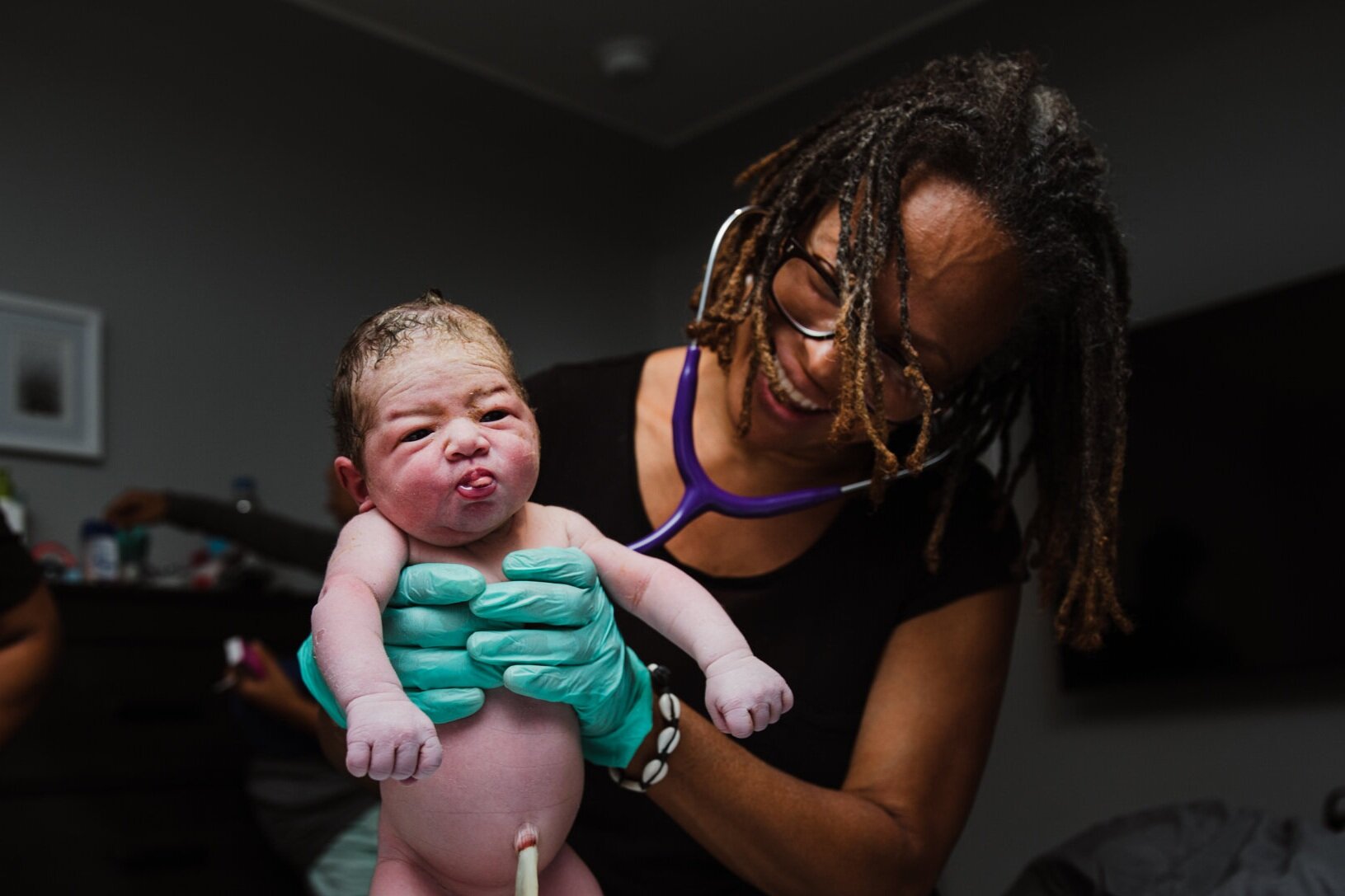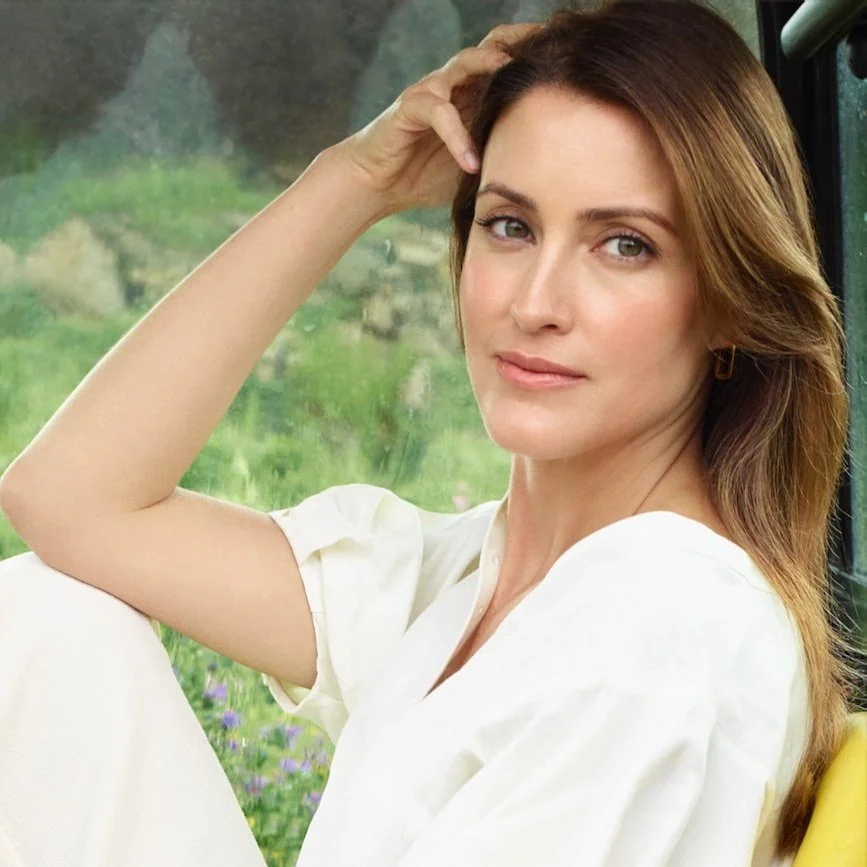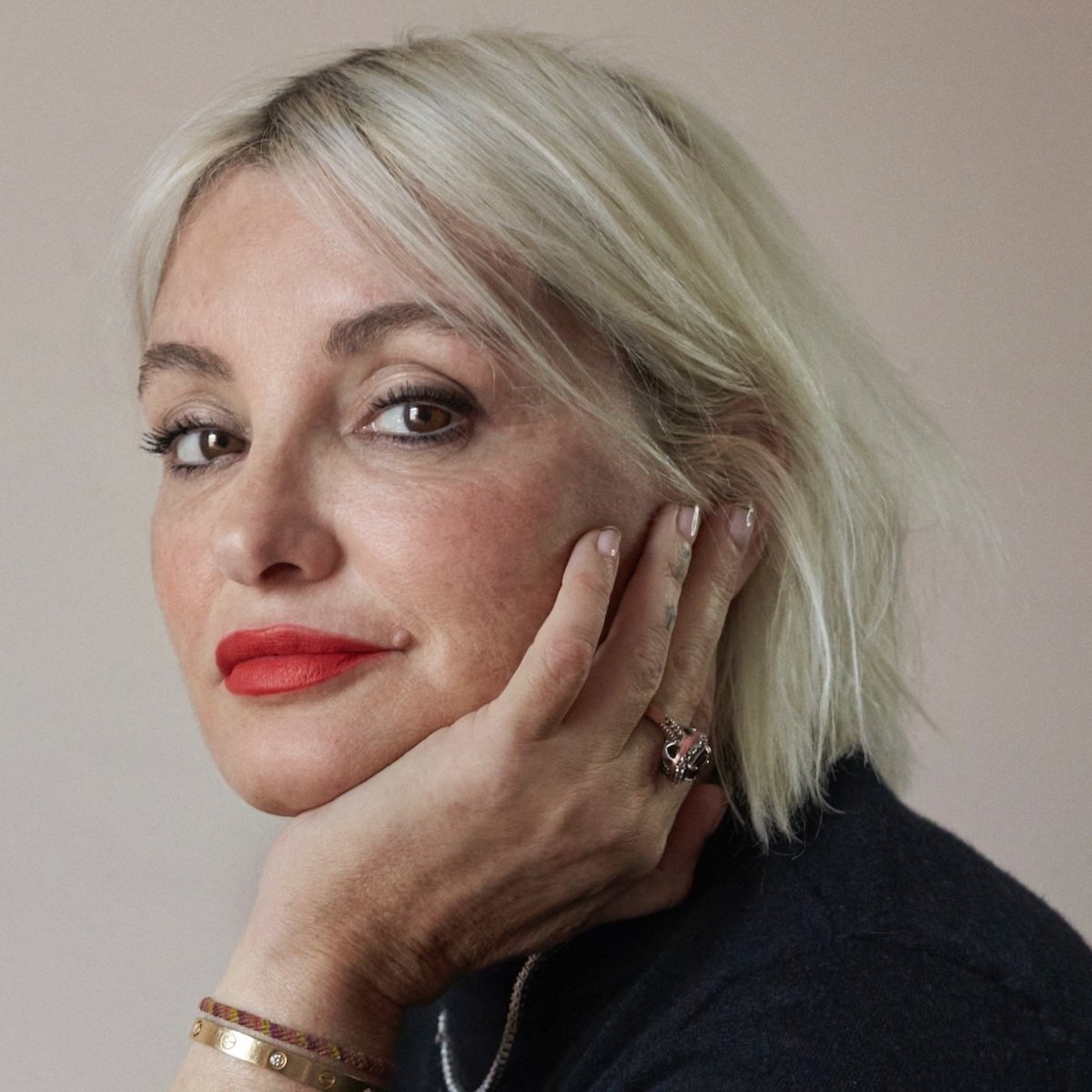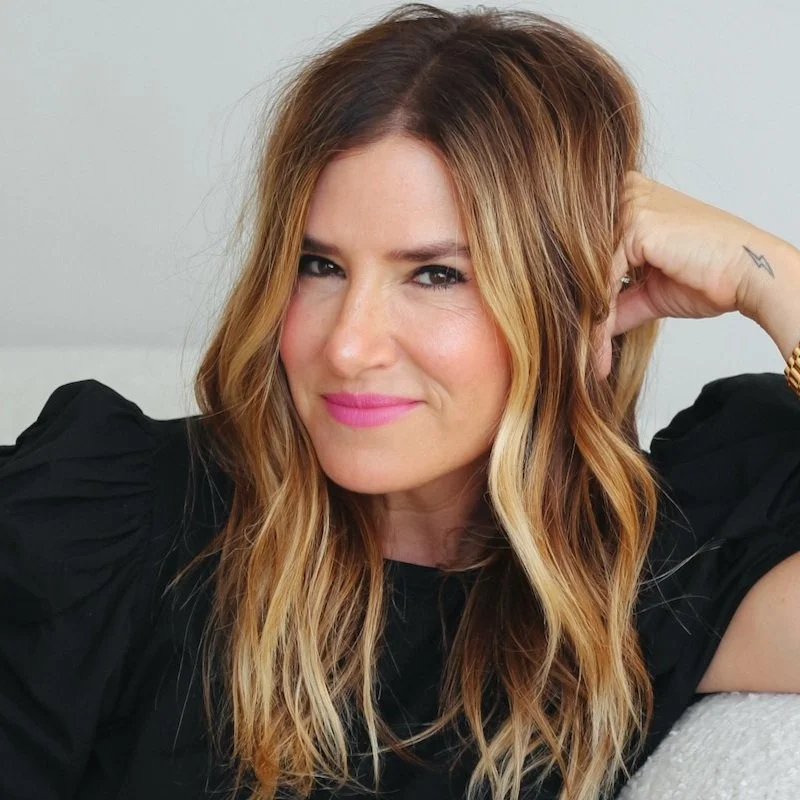Kimberly Durdin Is Healing The World
by Katie Pace
Nine years ago, I was newly, and for lack of a better term, shockingly pregnant with my first child.
I was unprepared, anxious, and more than anything, lonely. The first of any one of my friends or family members to get pregnant, I had no one to talk to about it. No one to share advice or understand the fears, struggles and joys. I was missing a village.
But nevertheless, around my seventh month of hugeness, I walked into a birth prep class held in a community birth center in Los Angeles. There were eight-ish couples in attendance and we’d spend the next six Saturdays together for four hours a day, learning about birth – with an emphasis on delivering at home. We talked about what to expect, the biology and the process, techniques and partner support. But unlike many birth classes, we also discussed the emotions and enormous life-change involved in new parenthood. And in the process, we became friends with these other couples bringing babies into the world alongside us.
But it wasn’t our doing.
It was with the wisdom and vulnerability of our fearless leader that we were guided into a loving, supportive, and like-minded community that we still have today.
It was because of Kim Durdin.
Kimberly Durdin is a certified childbirth educator, lactation consultant (IBCLC), doula, and newly minted midwife in Los Angeles. She provides counseling, childbirth and postpartum support, as well as mentorship for future birthworkers. She was awarded the Best Lactation Professional of 2015 by the Doulas of Southern California and the Student Future Leader Dr. Paul Fleiss Award in 2016.
When I was beginning the research for this article, she was prepping for her own midwifery exam, having just finished school in December after many years of classwork and student practice. I didn’t dare bother her for an interview during that time, but I did speak to her daughter, Yhanni – a friend of mine that I met somewhere, somehow, through the interwoven circles of communities created by her mother. She told me it was imperative that Kim be undisturbed and able to focus. Because most Black midwives don’t pass the test on their first try. And she was just days away from it.
When we did finally talk, she with her passing grade and I with my heart full of pride, I told her why I wanted to write about her. We talked about how with racial disparities finally at the forefront of the media, many white companies are trying to recognize their own implicit biases and racism, do better, and put Black voices at the forefront of their brand. Individuals are identifying their privilege and realizing that they are part of the problem – myself included.
I told her I was now a writer for The Candidly, a wellness site that’s inclusive of mind, body and spirit, but I still couldn’t help but think about how white “wellness” is.
“we’re often so overburdened from assault, the weight of the world, and then grief, that we have to take a breath to just begin to work on the healing. ”
“See, when white people think about taking care of themselves, they think wellness. But when Black people think about taking care of themselves, they think healing. We have to focus on how to heal ourselves, before we can ever achieve wellness. And we’re often so overburdened from assault, the weight of the world, and then grief, that we have to collectively take a breath to just begin to work on the healing. So, wellness isn’t for us. It’s for white people.”
Oof.
And there began our lengthy conversation about why Kim is not just a Black birthworker, but why she’s created a birth center, community space, and training center for marginalized families and Black birthworkers in South L.A.
Kim began her work within the birth world as many do – when she had babies. While she’d planned to be at a hospital with a midwife, the birth of her eldest ended in an unwanted cesarean when the baby was breech. So, when it came time for her second baby, she knew that no matter what, she didn’t want another c-section OR the hospital. But the birth center wouldn’t approve a VBAC (Vaginal Birth After Cesarean), as some doctors still won’t do today.
“But then,” she said, “I met this beauuuutiful, powerful, Black Caribbean midwife. She had just gotten licensed and I just gelled with her so much that I knew she was my midwife. Then my homebirth was such an amazing, transformative experience that I remember going to her within that first year postpartum and saying, ‘I think I want to become a midwife!’”
The intention was set.
Kim, not quite 30 years old, was living in Brooklyn with two kids under three. With a background in fashion, she was making children’s clothes and baby slings from African textiles, but she said, “I needed to make some real money. And I just could not figure out how to go back to work with kids. All the options of going back to a job and finding day care…I just couldn’t figure it out. It was all cost prohibitive and sounded horrific.”
Around this same time, she began attending a La Leche League meeting – a breastfeeding support group – at a woman’s house down the street. When the leader, a white woman, suggested they hold the meetings at Kim’s house instead, she obliged, unknowingly setting the foundation for her first community and the beginnings of her own reformation.
“And that was the thing that was so amazing. Those meetings were really the catalyst for me healing through my own challenges as a mom,” she said. “You think for so long that you’re the only one. But then I discovered the power of the group. It’s so much more important to be part of something than on your own. And what was extra powerful, was that once we moved the meetings to my house, the meetings started getting really Brown,” Kim tells me, chuckling.
Women of Color were finding a safe space within Kim’s home, and it quickly became a place where they gathered for breastfeeding, comradery, support and friendship. People would stay for hours and hours, learning and loving, sharing and snacking, and it was then and there that she says she her place was with women and their babies. And she heard a voice, either from beyond or from within, that told her she needed to create a real physical community space for people.
She believed it so strongly that she even drew it out on paper.
She told me the story, rehashing the memory in a way only Kim could. “And then I heard from Spirit, ‘Will this still be your dream if it takes you 25 years?’ And I thought, ‘25 YEARS?!? 25 YEARS?! THAT’S A LONG FUCKIN’ TIME!’ I didn’t know. I experienced cognitive dissonance; feeling that this was supposed to happen so strongly, but then also hearing 25 years and thinking ‘I don’t know what the fuck I’m going to be doing in 25 years!’”
It was during those early days that Kim took her first steps as a professional within the birth world and became an official leader for La Leche League – a predominately white organization. She was set on changing the story that Black women don’t breastfeed.
Over the course of the next two-and-a-half decades she became a certified lactation consultant, doula and birth educator. She taught, counseled and showed up for hundreds of women and families, me included, creating spaces for them and their babies to thrive. But as these families evolved, so did she.
“the systemic racism in this country begins long before conception; in America, not even birth is equal.”
Now a mother of six, Kim knew a few years ago that the next notch on her belt was finally becoming a midwife. And through her schooling, student midwifery and especially one conference in 2017, she continued to explore more about what she’d known all along: the systemic racism in this country begins long before conception. And while millions of women have babies every day all across the world, in America, not even birth is equal.
The inequities between white women and Women of Color, specifically Black women, before, during and after birth in the United States are statistically appalling.
Black pregnant women are four times more likely to die from pregnancy-related complications than white women. They are also two to three times more likely to experience preterm birth, and three times more likely to have a low birthweight infant.
These inequalities persist even after researchers use controls for medical and sociodemographic risk factors, such as low income, low education, and alcohol and tobacco use. In fact, research shows that the gap widens as socioeconomic levels increase. To explain these persistent disparities in health outcomes, researchers now theorize that there is one root cause: racism.
Institutionalized racism in health care results in Black women often receiving poorer quality care than white women. When Black women seek help for pain, they are often treated with a lack of dignity and respect and even given a denial of care from providers. The collective experiences of racism, sexism and stress, especially during sensitive developmental periods, trigger a chain of biological processes, known as weathering, that undermine Black women’s physical and mental health.
This long-term psychological toll of racism puts Black women at higher risk for a range of medical conditions such as preeclampsia (pregnancy-related high blood pressure), eclampsia (a complication of preeclampsia characterized by seizures), embolisms (blood vessel obstructions), and mental health conditions. All of which may lead to preterm birth and maternal and/or infant death. And the only way to end the fear and the disparities is by creating more Black birth workers.
But that’s not an easy road. Because as it is with everything else, Black women have a surplus of barriers in the way. The financial costs of schooling, testing, and even the license itself is high. Finding a Black midwife as a preceptor to take you under their wing as a student is rare. And if a black woman finds a white midwife to do it, they often experience even more racism going forward.
Kim’s frustration is palpable as she tells me, “When Black midwifery students study under white preceptors, those white preceptors usually have white clients. And if their white clients are racist, then it’s limiting the opportunities for Black students to learn. They’ll be like ‘I don’t want her at my birth. I don’t want her to touch me. And I don’t want her to touch my baby.’ And that happens a LOT.”
So, if they happen to even make it to the exam, many Black women are exhausted from all of the hoops they had to jump through to get there, that they usually don’t pass it on the first try. The exam itself isn’t even set up for a black woman’s success. It’s written by nearly all white CNM and CPM credential boards, who live in rural areas and practice in a much different way. It isn’t relevant for urban or community midwifery, as most Black midwifery students have been taught. And it’s designed to be more subjective than evidence based – leaving midwives of color to have to guess and make assumptions about how a midwife in a rural area would handle a situation.
“despite Black women’s long history of midwifery, Black women today make up only 2% of the 15,000 midwives in the United States.”
Therefore, despite Black women’s long history of midwifery, Black women today make up only 2% of the 15,000 midwives in the United States.
Perhaps things are slowly starting to change. Jennie Joseph, a Black midwife in Orlando, Florida created Commonsense Childbirth Inc., a 501(c)(3) and group of birth centers, maternity clinics, and midwifery schools. Their goal is to eliminate racial and class disparities in perinatal health while improving birth outcomes for all. Jennie speaks nationally and internationally, sharing her positive outcomes on low birth weight, prematurity, and infant and maternal mortality rates that remain high in disenfranchised populations in the U.S. And as of the week this article is published, the Midwifery Education Accreditation Council has approved her organization as the first and only Black-owned and nationally accredited private midwifery training school in the United States. And maybe, just maybe, this will create space for NARM (The North American Registry of Midwives) board and exam to eventually evolve as well.
But Kim passed. On the first try. She says she worked hard, prayed a lot, and knows her ancestors and community were with her. But she thinks she just got lucky. I, personally, think it was more than that. I think it was that little thing inside of her that gives her fire. That spark inside of her that burns bright enough for all of us to see and want to follow her light. But she passed. She. Passed. And now she’s set on creating the path for others to do the same.
Kim’s dad taught her to create that path. Her own, new path, that is. After the war he got a job as a postal worker and all the Black people told him what a great job it was.
“You’ll get good pay with a good pension,” they said. “And you’ll be able to keep that job for a long time.”
But her dad felt differently. He watched the Jewish businessmen make their own way and become successful despite discrimination and everything stacked against them. And was inspired by it. He told her “If I kept my postal worker job for the next 40 years, every year I’d still make about the same amount of money.”
“The post office doesn’t offer any risks,” he said. “And that’s good for some people. But what’s the trade-off? The risks won’t always work out, but when they do, the sky’s the limit.”
When I spoke to Kim, it was Father’s Day. Her voice quivered as she gushed about him, “He made it so entrepreneurship never seemed like a barrier for me. He was really ahead of his time. He always told me to just do what I love. And that’s really what colors my work today – being independent and creating something that’s an expression of who I am and who the people I work with are and how we want to serve the community.”
Before talking about her business, Kim declares matter-of-factly, “I do nothing singularly.” So, armed with a slew of certifications, licenses, and her father’s entrepreneurial spirit, she and her partner Allegra Hill, also a Black Midwife, have established Kindred Space L.A. – a community space, birth center and training center for their non-profit, The Birthing People Foundation.
Birthing People empowers People of Color by providing free and low cost education, training and certification pertaining to pregnancy, birth and postpartum; such as doulas, childbirth educators, lactation consultants, birth assistants and midwives. It’s designed to address the maternal and infant health disparities in communities of color and other marginalized groups. And help change birth outcomes for marginalized people, while bringing Black and Brown women back to their roots as the original wellness providers.
They just signed the lease on a new location for Kindred Space in South L.A. It’s a place for people to come together for everything from parent groups to birth classes to trainings – in a safe space. Kindred means “similar in kind.” And while it may be a family hub centered around Black and Brown people, it’s not exclusive. It’s a haven for Black, Brown, LGBTQ and other marginalized people – and their people, whatever they may look like. Kindred Space is open to anyone – including white folk who are open to learning and may be doing their own kind of healing. It’s the vision that Kim had 25 years ago. All along the way she’s been able to create spaces, groups and communities that have gotten her to this ultimate goal.
The appreciation swells in her voice as she says to me, “This year I’ll be 55. And I feel delighted and honored and grateful to create a space where ideally, we can train up other professionals that need guides to do this work and also create a space that can last a long time and become a model for other communities. Because we don’t just need one space. We need lots and lots of spaces.”
Following a long and agonizing three-day birth of my first baby, I was in a postpartum haze of exhaustion and what I believe now to be a little bit of shock and trauma.
I had taken Kim’s homebirth classes and was anticipating a much speedier delivery, but it didn’t go quite as planned. Kim wasn’t there for the birth, but my midwife came by two days after to check on me and I had barely fed the baby since she was born. I was supposed to be nursing, but it wasn’t going well, and I think I was in some denial that it had to happen. The baby was screaming a lot and I hadn’t slept in days and my brain just wasn’t functioning as it should be. I took a nap following the midwife’s check-in and woke up to “Mama Kim” sitting on my bed. “Hey there, mama,” she said. “How ‘bout we work on feeding this beautiful baby?”
She sat and talked to me for a long time. She showed me how to open my sleepy baby’s mouth so that I could get the right latch. And she listened as I emotionally unpacked everything that had occurred in the last few days, nodding and mm-hming while encouraging me to sip my water. I don’t remember much about what happened after. But I know that I nursed that crying baby for three years. And that Kim was the one who began my own understanding of the “power of the group,” and my own process of healing.
As we wrapped up our conversation the other day, I said to Kim, “What do you dream about now when you go home at night?”
She paused and took a deep breath and began to speak very slowly.
“i dream about helping lots of brand, new people arrive at this planet safely. That’s it.”
“I dream about helping lots of brand, new people arrive at this planet safely. That’s it. And I know that when people have support around them as they’re bringing in new life, that they are better equipped, mentally, physically, spiritually, and emotionally, to handle this tough job of parenting. So, when we help folks navigate this process and have these experiences in a safe and beautiful way, we’re doing our part to make this world a more beautiful place.”
“Everything changes when we have a baby,” she says. “You’re moving into a different space and you need people around you that are also in that space. We need each other to do this together. It’s really basic. It’s all basic rights and decency. How we help people get to the planet has a huge impact on their souls and how they move forward in the future. That’s what heals the world. This is the work that heals the world.”
This is the work that heals the world.
If you’d like to be a part of helping Kimberly Durdin do the work that heals the world, you can donate here to Kindred Space L.A.
Katie Pace is an LA based ex-ad creative who is now a writer by day and everything-elser by night. You can find more of her articles here.










